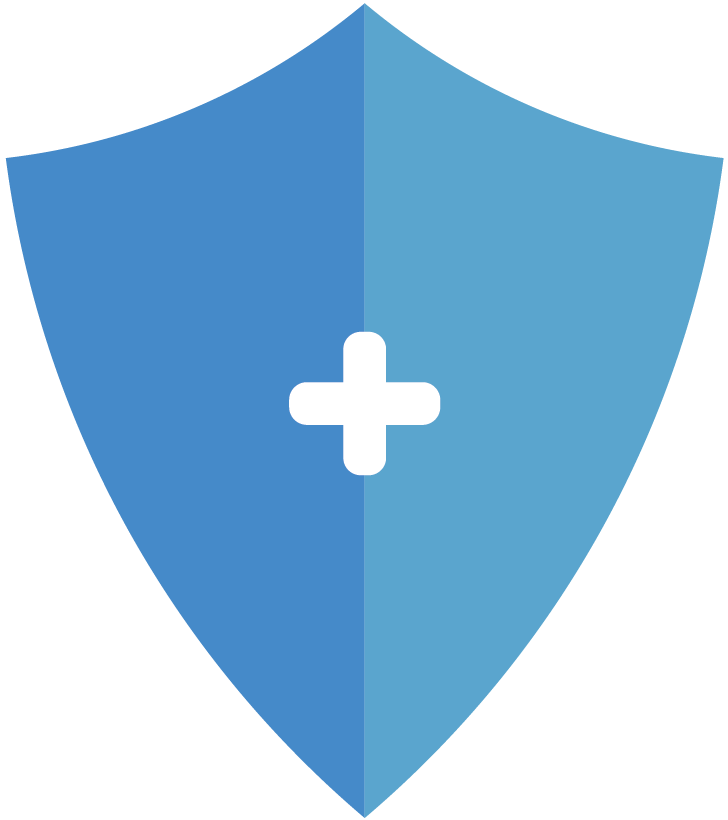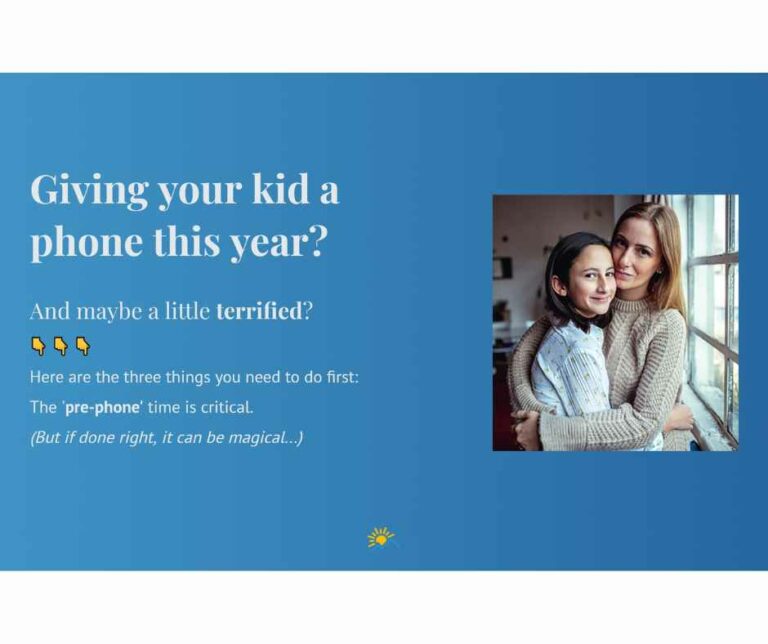Children are suffering from the effects of early sexualization. One major culprit is early exposure to porn. Usually this is due to initial accidental exposure. In this article we refer to a variety of medical experts who are noticing this trend, because current data is unfortunately limited.
For example, James Schroeder, a pediatric psychologist whose article on porn was picked up by Yahoo!News, recently stated:
“As a child psychologist, I am increasingly working with younger and younger youth who acknowledge that porn has negatively impacted their lives.”
Table of Contents
- Mandatory Car Seats and Movie Ratings, But No Protection From Early Exposure To Porn
- Early Sexualization and Porn: Playing With Fire
- Visual Media Impacts Developing Brains
- Mental And Emotional Effects Of Early Exposure To Porn On Children
- Early Exposure To Porn: Potential Physical Dangers
- How to Protect Children From Early Exposure To Porn: Experts Weigh In
Mandatory Car Seats and Movie Ratings, But No Protection From Early Exposure To Porn
Dr. Gola, a neuropsychologist, noted this same trend of younger children viewing porn in a recent interview with Kristen from Defend Young Minds. Since data from younger age groups is difficult to find, this was a revealing conversation:
“DR. GOLA: We just published a study where we were tracking behaviors of 300,000 people on the internet. And among them were also kids–starting from seven years old. And guess how many kids in the group from 7-10 were watching pornography at least once a month.
KRISTEN: I’m going to let you answer, because that was my next question–what’s your data on how kids are watching porn? What’s your latest data? So tell me about this.
GOLA: 25% of boys and girls. So every fourth kid was watching porn at least once a month.”
Evidence of early exposure to porn should be a wake-up call.
These statistics are dismaying, to say the least! As a society we have a movie rating system in place for the very purpose of protecting young, impressionable minds. Our nation enforces car seat laws, liquor and drug restrictions for minors. Similarly, we use social services to help children and protect them from child abuse.
We also “police” industries that harm people and the environment. So how is it that potentially 25% of our children are accessing porn every single month?
Is it that we don’t actually believe pornographic material is that dangerous of a risk for children? We hope our research serves as a wake-up call.
Over-exposing children to sexually explicit material is linked to risky sexual behaviors. Also, it warps a child’s healthy development, according to the research we are sharing with you here.
Let’s consider how early exposure to porn and sexualization are related, first of all.
Early Sexualization and Porn: Playing With Fire
The Harvard International Review states: “sexualization as defined by the American Psychological Association is ‘the inappropriate imposition of sexuality… through objectification, overvaluing or emphasizing appearance and/or sexual behavior,’ regardless of the presence of physical sexual assault”.
Often we refer to the effects of early sexualization of little girls when they’re dressed in mature, adult styles and objectified in a sexualized way. When adults tell girls they’re “sexy”, for example, children are being sexualized.
As the Harvard study notes, early sexualization can be direct or indirect. For a child, any viewing of porn is “an inappropriate imposition of sexuality”. So why does this matter?
What are the effects of early sexualization on children?
The honest answer is that we don’t fully know all the effects yet. Easy access to sexualized media such as porn via smartphones and tablets is a recent online phenomenon.
We didn’t prepare for this as a society, and it’s difficult to fully research yet. The data is coming, though.
In response to Billie Eilish’s public statement that early exposure to porn damaged her brain, USA Today interviewed Dawn Hawkins, CEO of the National Center on Sexual Exploitation.
“They’re asking people who are like 18 about their experiences when they were 6,” Hawkins said. “But those who are 18 and in their early 20s right now, they didn’t have smartphones when they were 6, like our 6-year-olds do now. So, it will be a couple more years until we’re able to really understand the scope of how many of our younger children are being exposed. But we do know it’s a lot.”
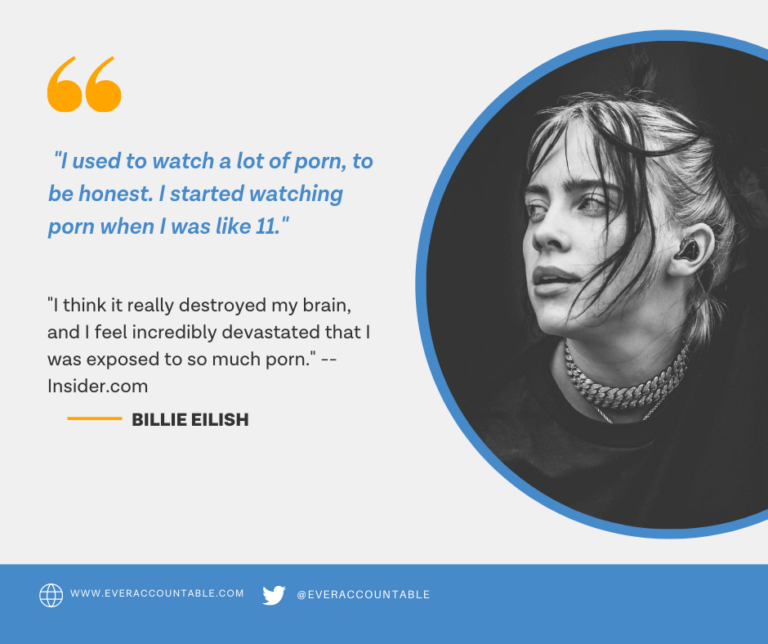
Visual Media Impacts Developing Brains
So we can’t know the full scope of porn’s effects on young children yet. However, we do know that a child’s brain is rapidly developing in early childhood.
The American Academy of Pediatrics (AAP) acknowledges that much more research needs to be done in the area of early sexualization through various media.
However, as the AAP notes, here’s how children learn from visual media:
“We know that young children (<7–8 years old) have trouble distinguishing between what is happening on the screen and what could happen in real life. Taking cognitive processing capabilities into account will be important as we understand more about what and how children learn about sexuality from the media.”
According to Harvard University’s Center on the Developing Child, early childhood experiences produce life-long effects.
by Harvard University, Center on the Developing Child
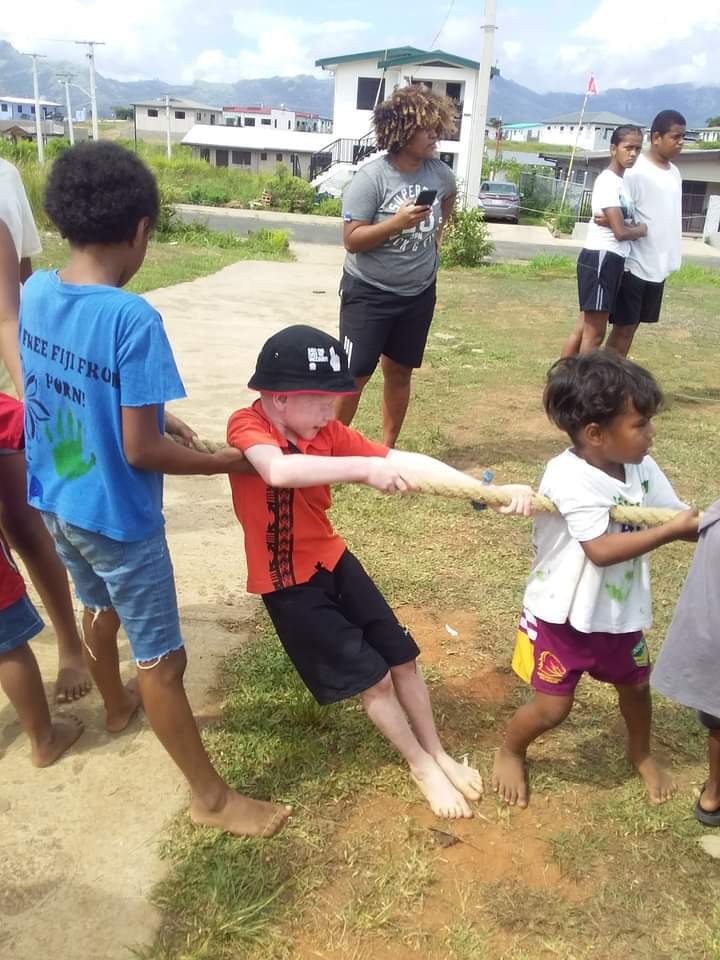
Mental And Emotional Effects Of Early Exposure To Porn On Children
Violent media affects young children.
Again, according to the American Academy of Pediatrics (AAP), very young children tend to tune out adult entertainment.
However, starting around age 6, the effects of violent media become much clearer, as the AAP states:
“There is little research on whether watching adult entertainment programming has an overall positive or negative cognitive effect, but there is fairly clear evidence that violent content can influence antisocial and aggressive behavior. This, in turn, may account for negative associations of viewing violent content with school achievement.”
A warped view of healthy intimate relationships is one effect of early sexualization.
Dr. Linda Papadopoulos, a renowned UK psychologist, talks about early exposure to porn in a Metro exclusive interview.
“Children are being presented with something that they’re not emotionally, cognitively or developmentally ready to see. They don’t yet have the ability to be critical of that information, or make sense of it, or to tell the difference between what’s real or what’s fake…
…And one of the most insidious parts is the conflation of sex and violence in porn, particularly towards women…”
Dr. Papadopoulos agrees. Early exposure to porn creates an unhealthy view of what healthy, intimate relationships look like.
Parents reports of children viewing porn reveals negative results.
During the 2020 Covid lockdown, a Washington Post article reports, two different Maryland families discovered their elementary-aged boys were accessing porn on their school-issued Chromebooks. Here’s what happened as a result:
“The families are unacquainted and live in different areas of the sprawling county.
The younger child, 9 years old, accessed hundreds of pornographic sites through Twitter, which his parents discovered Nov. 11 in the Web browser history of his school account, according to the five-page letter of complaint filed on the families’ behalf by attorney Timothy F. Maloney.
…The third-grader’s family was at first told by IT staff that little could be done, then later told Twitter is blocked for students the boy’s age, according to the complaint, which included a screenshot of some sites the child accessed. At some point, the student’s Twitter access was blocked…
The parents of the 9-year-old said their son had shown a “profound change” in behavior in recent weeks — anxious, withdrawn and frequently angry. He does not want to participate in virtual lessons or connect with friends, they said.
‘We wanted other parents to know about the risk,’ said the boy’s father.”
What these parents reported ties in directly with research that has been compiled so far. We believe that caring parents are on the front lines. We should listen carefully to their experiences, too!
But if this evidence isn’t enough, there’s more.
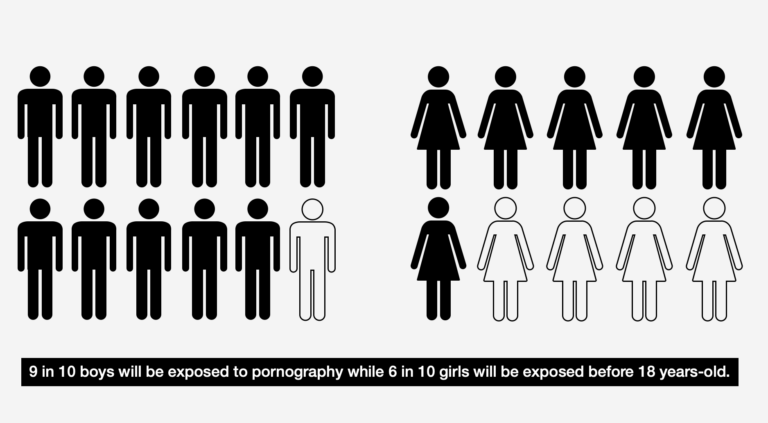
Mental and emotional damages of early exposure to porn are being noted by experts.
A recent USA Today article quoted Dawn Hawkins of the National Center On Sexual Exploitation, “Young children who view pornography frequently disengage from their family and start to isolate more, Hawkins said, noting that these children often become withdrawn, sullen or depressed.”
Is your child developing a new pattern of disengaging with family?
SOS Safety Magazine agrees that emotional withdrawal is one of several signs that your child might be secretly viewing porn:
“Another sign that your child is engaging in porn usage is that they will begin to lose interest in activities they once enjoyed. Porn takes over the brain and makes the user dependent on it for stimulus — making everything else seem dull and uninteresting in comparison.”
Is your child suffering from multiple mental health issues?
A medically reviewed article in Verywell Mind talks about multiple damaging effects of early sexualization on girls. This includes early exposure to porn:
“The ongoing sexualization of young girls is perpetuating gender stereotypes and leading many girls to experience various health and mental health issues. Some of the most common include low self-esteem, anxiety, eating disorders, depression, self-harm, and suicidal thoughts.”
Early Exposure To Porn: Potential Physical Dangers
Clearly, early sexualization of children has links to mental and emotional harms. Additionally, there are very real physical harms that parents, educators, and childcare workers need to be aware of.
Vulnerability to sexual predators is a growing childhood problem, but you can fight back!
It’s easy to lose track of your child’s online activity, even if you’re trying to be careful. Children are very vulnerable to grooming online.
The lure of apps like Snapchat and WhatsApp make connections with strangers and instant image sharing much easier. A recent UK Metro News article noted that parents should talk to their kids as young as age 9 about porn.
If children clearly understand the concept of good pictures and bad pictures, they’re less vulnerable to online predators at a younger age.
Sex trafficking of minors is an age-old disease and curse of humanity. However, the internet has vastly expanded this vile underworld. Online predators are always on the prowl, looking for children to groom and lure into their net. In fact, several different non-profit organizations exist based on this problem.
For example Roo Powell, who started Safe From Online Sex Abuse (SOSA) works undercover to help lure and catch online sexual predators. In fact, Investigation Discovery television highlights her work in a show called “Undercover Underage”. Powell says conversations about porn and sexting need to continue well into our children’s teen years.
Powell in an interview with Forbes says, “What I tell parents is that the best way to prevent predation right now is to have open lines of communication with your kids, because there’s really no stopping them from being on the internet — whether at home or at school or at friends’ houses. It’s part of our culture now. It’s part of their education, and it’s a part of how they’re being raised. The best thing we can do is prepare them for it. Teach them to trust their own gut. When something feels wrong or ick or gross or off, trust that feeling, and trust that they can go to a parent, caregiver, or trusted adult about it.”
As hard as it is, parents should bring up the topic of grooming online. Your child should be aware of the dangers! Internet Matters.org makes this conversation easier with this helpful video we’re sharing.
The risk of child on child sexual abuse behaviors should not be ignored.
The Harvard International Review article “All About Sex: Global Childhood Sexualization and Education” notes that one result of the sexualization of children is the influence on behavior toward their peers.
“The increase in media sexualization is also coupled with a reversal in the roles of victims and perpetrators; children find themselves on both sides of the spectrum, often at the hands of their peers.”
Child on child sexual abuse is on the rise according to Robin Reber, admissions director for a program dedicated to helping teens overcome sexual or technology addictions. Reber notes that pornography is clearly linked to these behaviors. She writes in an article for Defend Young Minds:
“Children simply do not just wake up one day and go touch another child sexually – it’s introduced, taught, learned and then explored. They are doing exactly what a child’s brain is set up to do–imitate.”
Another common form of this is sibling sexual abuse. The Canadian government addresses this in Sibling Sexual Abuse: A Guide For Parents. After describing the common signs of sibling sexual abuse (SSA), the guide notes contributing factors to SSA, including pornography:
“Access to pornography. Parents who leave pornographic material where children can look at it risk having their children imitate adult sexual behaviour. Children are also at risk if there is unsupervised access to the Internet where they may be exposed to pornography and/or in contact with adults or older teens who prey on children.”
Experiences of abusive sexual activity or early experimentation with sex are a result of early exposure to porn.
The recent UK Metro News article we mentioned earlier highlights the increases of experimenting with or acceptance of abusive sex in young people.
“I felt like I couldn’t say no,” was one sixteen year-old girl’s response to abusive sexual advances.
Unfortunately, she credits her exposure to porn for her inability to stand up for herself.
As noted in this New York Times article, “The Impact of Early Sexual Initiation On Boys”, teen boys tend to experiment with sex at earlier ages than girls. Porn feeds that experimental curiosity.
Early exposure to porn hinders a child’s ability to experience true intimacy later on. It also potentially encourages them to become sexual perpetrators. They’re too immature to understand the meaning of consent. Nor are they ready for a committed relationship. That’s why parents in the UK are being urged to talk to their children about porn by age nine.
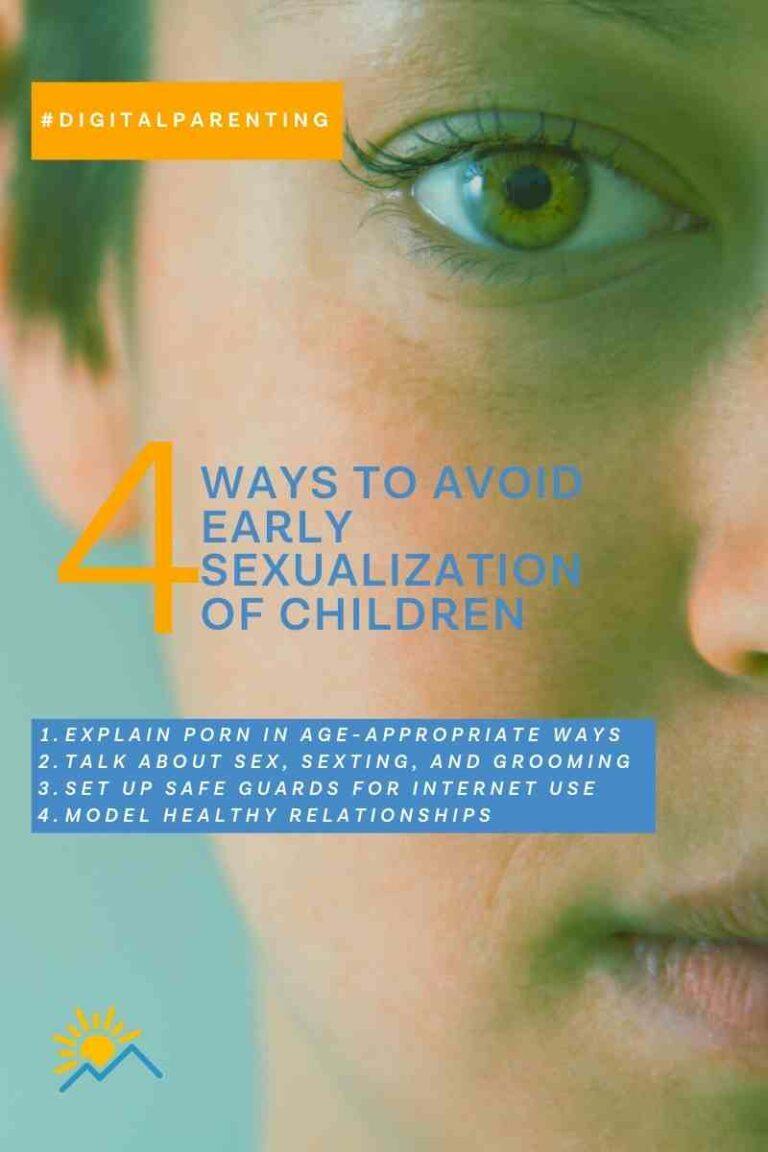
How to Protect Children From Early Exposure To Porn: Experts Weigh In
Preventing early exposure to porn reduces the risk of early sexual experimentation and sexual abuse.
Courtney Schmitz, LCSW, generously shared her time with us. As a licensed social worker, she notes that sexual curiosity at an early age is completely normal.
She says,“If all we do around the topic of sex is discourage and shame, or even just ignore, the more we lose the ability to help shape the narrative they are creating around sex into an informed and safe one.We might not be able to control their access to sexualized material but we can assist them in making sense of it.”
Mrs. Schmitz also noted that unmediated exposure to porn seriously warps a child’s understanding of consent.
Sadly, this opens the door to sexual abuse or early experimentation with sex.
“An important part of the conversation of early sexualization of children is that they are completely unable to provide proper consent to adult sexual acts, among other important reasons. Developmentally they are vulnerable to manipulation and coercion by adults.
Unmediated early exposure to pornography warps the concepts of healthy sex, consent, and safe boundaries.Their brains and bodies are in critical developmental stages.” says Mrs. Schmitz.
Though we can’t bubble-wrap our children and protect them from every harm, it’s vital to protect them from repeated exposure to porn.
Other experts in child development agree.
Who better than a loving dad and pediatric psychologist, as well as a neuroscientist, to offer advice on how to nurture a healthy childhood free from porn?
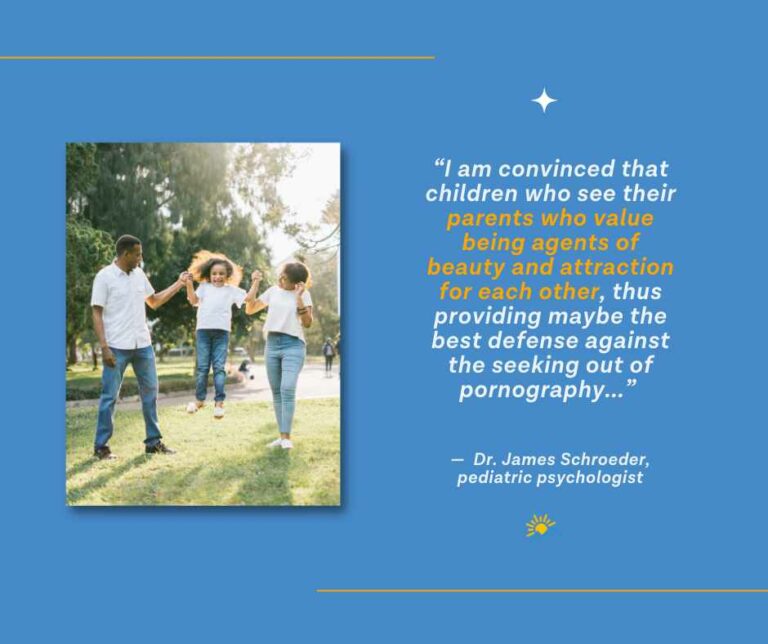
A pediatric psychologist and father of 8 offers practical solutions.
We mentioned James Schroeder initially because his position as a pediatric psychologist puts him at the forefront of the battle against early exposure to porn.
You can read his full article “The Pornography Plague” from the link provided in our source section at the end of this article.
Here’s a few of his timely tips:
- Limiting repeated access and early exposure to porn is key.
The most obvious practical advice is to guard your children’s access to the internet and use filters, blockers, and accountability software on any devices they use. Porn WILL find your child, one way or the other, though.
- Model love and affection between parents.
One of our favorite pieces of advice from Schroeder was the power of a parent’s example.
In essence, Dr. Schroeder says, go love your spouse well and openly demonstrate attraction and affection for each other. You don’t have to be perfect, but love really is the answer.
He strongly warns that children are not neurologically ready for the dangers of unlimited access to the internet.“I am convinced that children who see their parents who value being agents of beauty and attraction for each other, thus providing maybe the best defense against the seeking out of pornography, will be less likely to seek out unhealthy sources of pleasure, and not just of a sexual sort.” — James Schroeder, pediatric psychologist
- Additionally, Dr. Schroeder pleads with parents to limit screen time.
The screen time conversation is not just a one-and-done conversation.
In fact, if you’re a parent, this feels like a never-ending battle, especially as children hit the “tween” years!
Help is here! Click here to read our guide to having THE most important conversation before you give your kids a phone. (And, equally important, how to keep on having those conversations afterwards.)
We offer more easy-to-use tips that line up with Dr. Schroeder’s basic advice to parents, including limiting screen time in our practical article, “How To Talk To Your Children About Porn”.
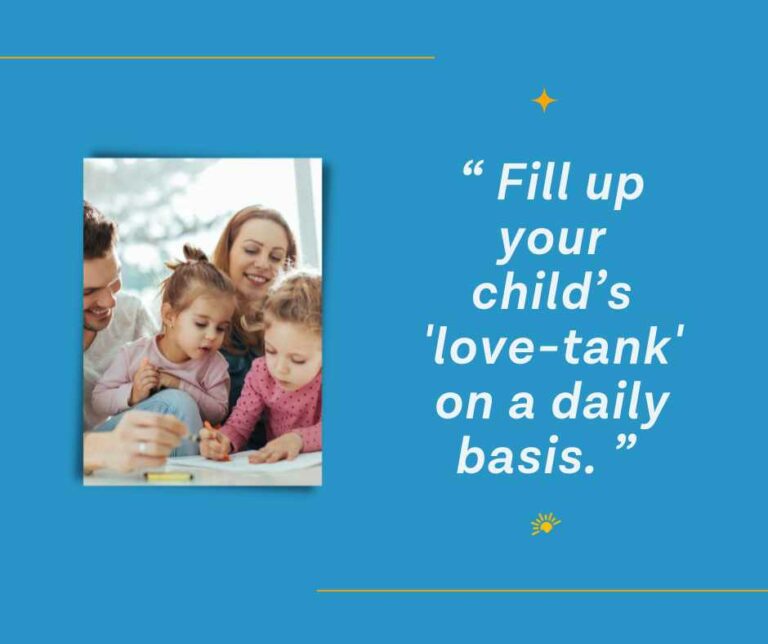
What a neuroscientist says about healthy childhood development is crucial, too.
Then there’s a witty neuroscientist who offers loving advice to parents based on a study of animal babies’ reaction to physical affection.
In his Psychology Today article “Lick Your Kids” Alex Kolb, PhD says, “The point is that kids need attention and physical affection in order to properly develop their neural circuitry.”
Kolb notes that rats who licked their babies frequently had baby rats that responded well to stress with less of a fear response and more resilience. Those baby rats also grew up to be loving, attentive rat parents.
We’re not telling you to go lick your kids! But, we are saying this. Fill up your child’s “love-tank” on a daily basis.
Somewhere along the way, I picked up some very helpful mom wisdom from another parent about filling your child’s “love tank”. It’s similar to what Dr. Kolb is saying. Good parenting involves so much more than keeping a roof over your child’s head and food on the table.
Life gets overwhelmingly busy. It’s easy to become emotionally neglectful, when you’re not very intentional.
If you’re finding your child super irritating, consider what their behavior is telling you. When my child was acting out or overly anxious, this raised a potential red flag. I needed to find a way to fill her “love tank”! But how?
- How often do you smile warmly at your child?
- Pull them into an affectionate hug?
- Delight in simply going and doing something fun with them — without checking your phone 50 times?
These little, daily actions matter as you seek to meet your child’s emotional needs – and fill up their “love tanks”.
When you daily gaze at your child’s beautiful little face with smiling eyes full of love and appreciation, you ARE building a better tomorrow for them and for the entire world.
At the end of the day, no one article can teach you how to handle all the challenges. Still, there are practical steps we can take to protect or limit our children from early sexualization.
Early exposure to porn short-circuits a child’s healthy development, especially if the exposure goes unchecked.
Be encouraged and empowered to take action! We’re here to help you protect and nurture our world’s most valuable resource – our future generation.
*”Ever Accountable’s blog is not intended to be a substitute for professional advice, diagnosis, or therapy, though we often link to medically reviewed studies.”
WORKS CITED:
https://hir.harvard.edu/all-about-sex-global-childhood-sexualization-and-education/.
https://publications.aap.org/pediatrics/article/140/Supplement_2/S162/34185/Sexual-Media-and-Childhood-Well-being-and-Health.
https://developingchild.harvard.edu/resources/connecting-the-brain-to-the-rest-of-the-body-early-childhood-development-and-lifelong-health-are-deeply-intertwined/.
https://publications.aap.org/pediatrics/article/140/Supplement_2/S57/34173/Digital-Screen-Media-and-Cognitive-Development.
https://metro.co.uk/2022/01/23/i-felt-like-i-couldnt-say-no-the-truth-about-kids-and-porn-15956276/.
SOSA — Safe from Online Sex Abuse, https://sosatogether.org/. Accessed 21 March 2022.
https://www-forbes-com.cdn.ampproject.org/c/s/www.forbes.com/sites/risasarachan/2021/11/18/undercover-underage-roo-powell-poses-as-a-teen-to-track-down-child-predators/amp/.
https://www.starguideswilderness.com/.
https://www.canada.ca/en/public-health/services/health-promotion/stop-family-violence/prevention-resource-centre/children/sibling-sexual-abuse-guide-parents.html.
Brown, Faye. “Parents urged to talk to children as young as nine about porn and sex abuse.” Metro, 17 December 2021, https://metro.co.uk/2021/12/17/parents-urged-to-talk-to-children-as-young-as-nine-about-porn-15785604/. Accessed 21 March 2022.
“Childhood Emotional Neglect: Signs, Lasting Effects, & Treatments.” Choosing Therapy, 24 September 2020, https://www.choosingtherapy.com/childhood-emotional-neglect/. Accessed 21 March 2022.
Defend Young Minds. https://www.defendyoungminds.com/post/porn-addiction-kids-neuropsychologist-reveals-who-is-most-vulnerable-interview-dr-gola.
Korb, Alex. “Lick Your Kids.” Psychology Today, 29 February 2012, https://www.psychologytoday.com/us/blog/prefrontal-nudity/201202/lick-your-kids. Accessed 21 March 2022.
“Online grooming advice and risks.” Internet Matters, https://www.internetmatters.org/issues/online-grooming/. Accessed 21 March 2022.
“Porn is distorting children’s view of sex. Just ask Billie Eilish.” USA Today, 18 January 2022, https://www.usatoday.com/story/opinion/2022/01/18/billie-eilish-porn-distorting-children/9047170002/. Accessed 21 March 2022.
Reber, Robin. “Child on Child Harmful Sexual Behavior Part 1: A 3-Step Path to Prepare Parents.” Defend Young Minds™️, 13 April 2021, https://www.defendyoungminds.com/post/child-on-child-harmful-sexual-behavior-part-1-3-step-path-prepare-parents. Accessed 21 March 2022.
Schroeder, James. “The Pornography Plague – james f. schroeder.” james f. schroeder, 14 February 2022, https://james-schroeder.com/the-pornography-plague/. Accessed 21 March 2022.
“7 Signs of a Porn Addicted Child.” SOS Safety Magazine, https://sossafetymagazine.com/internet-safety/7-signs-of-a-porn-addicted-child/. Accessed 21 March 2022.
“The Sexualization of Young Girls and Mental Health Problems.” Verywell Mind, 3 February 2022, https://www.verywellmind.com/damaging-effects-of-sexualizing-girls-4778062. Accessed 21 March 2022.
St, Donna. “Children viewed pornography on school-issued laptops.” The Washington Post, 25 November 2020, https://www.washingtonpost.com/local/education/complaint-alleges-children-discovered-pornography-while-browsing-on-school-issued-laptops/2020/11/24/8e9c7cac-2dc8-11eb-860d-f7999599cbc2_story.html. Accessed 21 March 2022.
Swallow, Ruth. “4 Signs Your Child is Addicted to Pornography — South Summit Pediatrics.” South Summit Pediatrics, 12 June 2018, http://www.southsummitpediatrics.com/blog/signs-your-child-is-addicted-to-pornography. Accessed 21 March 2022.
14-Day Free Trial
Protection From Pornography
Change your habits, change your life: Start our 14-day free trial to help get rid of pornography for good.
